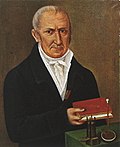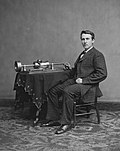Inventor
An inventor is a person who makes new inventions, devices that perform some kind of function. The devices are mostly electrical or mechanical. Someone that invents new ideas or methods on how to do things may also be called an inventor. Inventors can receive a patent.
Many inventors make small changes to old inventions. For example, people have invented new ways to make clocks over history. Early clocks were sundials, later clocks used water, and pendulums. Modern clocks are often electronic. Other machines such as vehicles are made of many inventions.
Famous inventors
- Nikola Tesla invented the alternating current motor, Tesla coil and many other things.
- Michael Faraday, scientist, discoverer of electromagnetic induction, inventor of the electric motor, founder of electromagnetism.
- Thomas Edison, inventor of the phonograph and many other things.
- John Kemp Starley, many improvements to bicycles.
- Karl Drais, inventor of the Laufmaschine ("running machine") the first bicycle.
- Guglielmo Marconi (1874 – 1937) pioneer of radio communication.
- Alessandro Volta, inventor of the battery.
- Gottlieb Daimler, inventor of the first four-wheel successful car.
- Karl Benz, inventor of the first successful car.
- George Stephenson (1803 – 1859) inventor of the improved locomotive.
- James Watt, inventor of the improved steam engine.
- Nicolas-Joseph Cugnot, inventor of the first car (propelled with steam engine).
- Nikolaus August Otto, inventor of the first internal-combustion engine.
- Richard Trevithick, inventor of the locomotive.
- Rudolf Diesel, inventor of the diesel engine.
Inventor Media
'BUILD YOUR OWN TELEVISION RECEIVER.' Science and Invention magazine cover, November 1928
Alessandro Volta with the first electrical battery. Volta is recognized as an influential inventor.
Thomas Edison with phonograph. Edison was one of the most prolific inventors in history, holding 1,093 U.S. patents in his name.
Johannes Gutenberg's printing press was voted the most important invention of the second millennium.
A rare 1884 photo showing the experimental recording of voice patterns by a photographic process at the Alexander Graham Bell Laboratory in Washington, D.C. Many of their experimental designs panned out in failure.
Eric M. C. Tigerstedt (1887–1925) was known as a pioneer of sound-on-film technology. Tigerstedt in 1915.
Western Arabic numerals — an example of non-material inventions
Railways — probably the most important invention in land transport (railway station in Bratislava, Slovakia)









